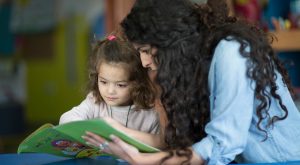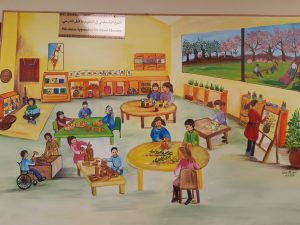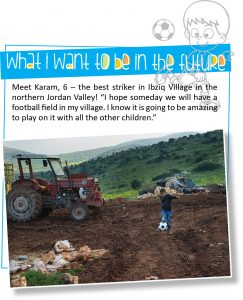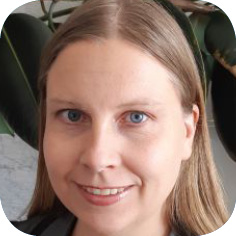Early education for all is a national policy priority in Palestine. Palestine adopted a basic education law in 2017. The law seeks to expand public preschools with the aim to eventually make this stage of education free and compulsory. With the Sustainable Development Goals (SDGs), early childhood education is for the first time included in the global goal for education for all. I went to the Ministry of Education to find out what the legal and policy developments mean for child rights in early childhood education in the Palestinian context. I talked about the topic with Dr. Rabiha Elayan, acting director general for general education, Suheir Awad, head of the Division for Preschool Education, and Najah Harb, preschool educational supervisor from the Ministry of Education.

Public preschool classes have been recently established, and the vast majority of children in Palestine attend private preschools. What rights does the law guarantee in practice?
“With the new law, it became the responsibility of the Ministry of Education to provide access to preschool education for five-to-six-year-olds, one year before entering grade one. We call this stage KG2. Our aim is to reach every child in Palestine, and we are prioritizing the most marginalized areas. The ministry is gradually opening preschool classes in government primary schools, especially in remote areas or areas with high poverty rates. We have success stories in places such as Jaluud in Nablus district, Abu Nuwaar in Jerusalem district, and Arab Frejat in South Hebron where children now for the first time access early childhood education. All children have the right to equal opportunities. This is why we are starting with the most vulnerable. There are still many challenges, of course. In Gaza, there are very few public preschools. In Area C, we must find alternative solutions for setting up classrooms. UNRWA does not provide preschool education, but the government cannot open schools in refugee camps either, and therefore we need the support of nongovernmental organizations to cater for children in refugee camps. We have plans to set up preschool classes in Gaza with the support of the World Bank. But we also need to strengthen public-private partnerships and support to private schools. The large proportion of unqualified teachers in private schools is a big challenge. We are working to launch a new diploma program to address this. By 2030, we aim to reach at least a gross enrollment of 95 percent in KG2, in line with the SDGs.”
Children with disabilities have an equal right to develop their potential and participate in society without discrimination. Yet, there are attitudinal and environmental barriers that prevent them from doing so. Do children with disabilities enjoy an equal right to early childhood education?
“We are not yet ready in our agenda and policies. We need to think more about how to develop inclusive preschools. Currently, children with minor challenges are accepted, but preschools are not catering for children with more severe disabilities. There are some specialized preschools for children with disabilities, but this is an area that needs much more attention. With the support of UNICEF, we are doing very valuable work to assess development and behavioral skills of children and have developed a tool for that. This will enable those children whose challenges are less obvious to be identified and supported at an early stage.”
Governments, but also parents or other guardians, are duty bearers responsible for the rights of the child. What is the importance of parental involvement in early childhood education? And what should parents know about preschool education?
“Parents need to understand the importance of play in children’s development. There are parents who expect children in preschool to learn to read and write, and they demand homework. They don’t look at early childhood education from the perspective of the rights of the child but rather as a preparation for formal schooling. Usually by the end of the year, parents are satisfied when they see the benefits to their child’s development. It is important that parents send their child to a licensed preschool. The license guarantees a minimum standard in terms of safety of the environment and a developmentally appropriate program. We are launching an advocacy campaign to educate parents on the importance of early childhood education with a set of key messages on topics such as play, positive interaction with the child, and respecting the rights of the child.”

Protection from violence, neglect, and abuse are rights of the child. How can these rights be enforced with parents, communities, and teachers; and within schools?
“The ministry has a policy of nonviolence in schools. We organize awareness sessions for parents and children alike on the rights of the child. Parents also need to be trained on positive discipline methods, on how to talk to their children and how to deal with children’s anger or sadness in a supportive way. And if a child comes to preschool with symptoms of neglect or abuse, there are counselors in public schools who can deal with the situation and talk to the parents. If needed, we refer the case further. Preschool teachers need to be prepared to manage behavior in the class positively, teach children to interact positively with others and respect their rights; for example, by sharing toys.
Unfortunately, many of our children live in an environment where they are exposed to violence due to the occupation and conflict. We try to ensure that preschools are protective environments in which children feel safe and free from violence. We try to identify the safest possible location for a preschool class, away from exposure to dangers such as tear gas and violent confrontations. In Hebron H2, the protective presence provided by international observers is very important, but since the TIPH (Temporary International Presence in Hebron) mission was discontinued, we are very concerned, especially about the youngest ones.”
You have recently launched a manual for teachers. How did you consider the rights of the child in this work?
“We have tried to gather existing best practices into a unified Palestinian approach to preschool education. This is the culmination of discussions with and input from numerous stakeholders and partners, and based on experience of organizations such as UNICEF, UNESCO, Right to Play, Save the Children, Terre Des Hommes, RTM, Trust of Programs for Early Childhood, Family and Community Education, World Vision, the Early Childhood Resource Centre, and Anera – all members of a thematic working group that provides technical advice to shape our policies. Our approach is holistic, inclusive, and based on learning through play. It utilizes children’s active agency and creativity. The preschool program is divided into four major themes through which children learn to take care of themselves, interact with their environment, and appreciate their identity and their Palestinian culture and heritage. The rights and best interest of the child are a benchmark for our approach.”



